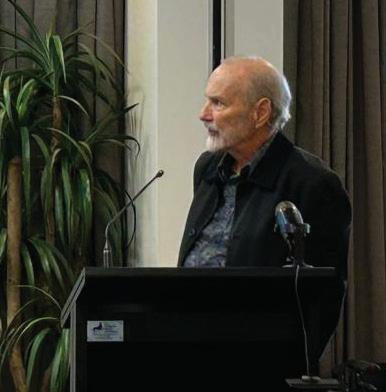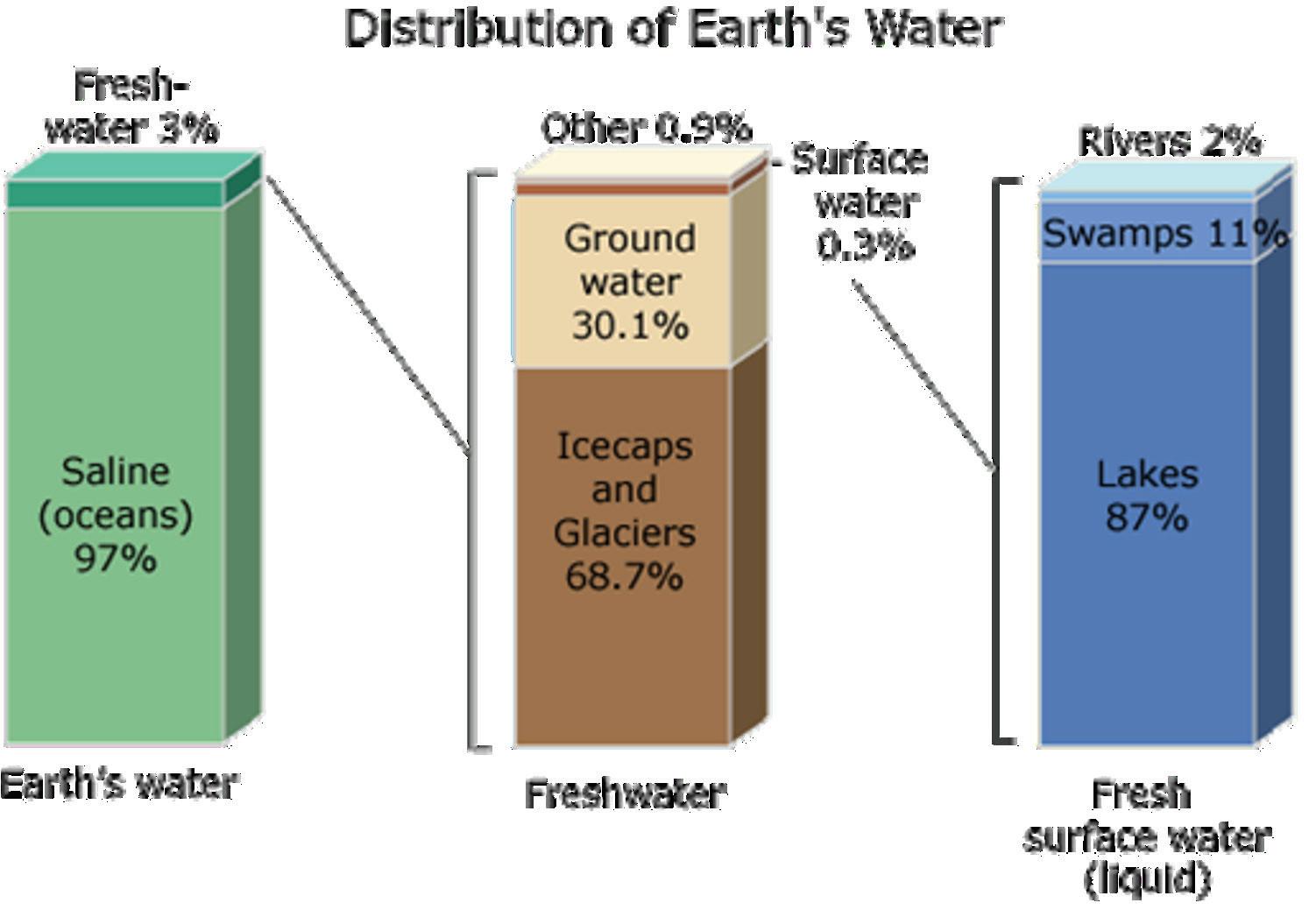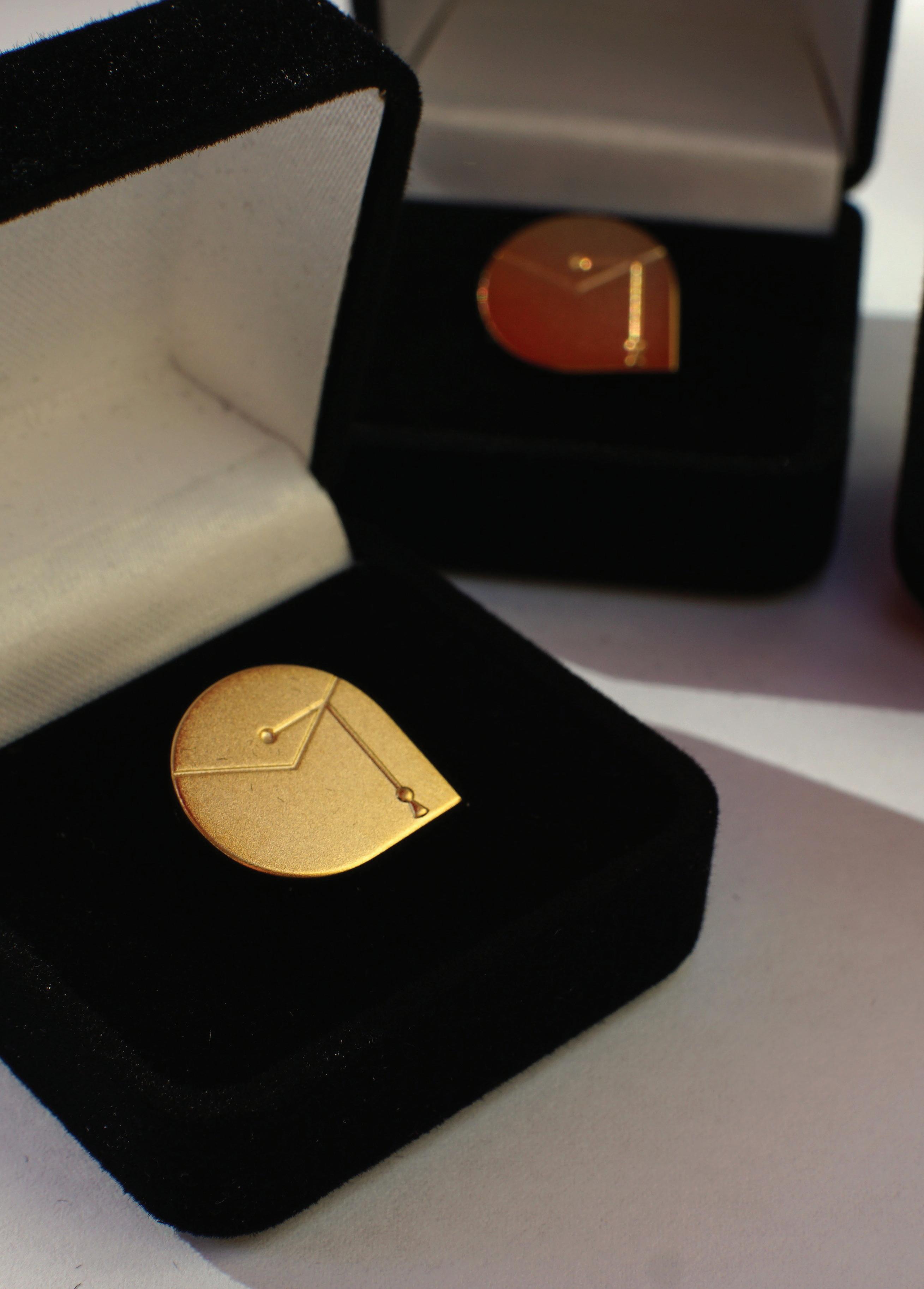NEWS LETTER
June
2025




members, If you have any suggestions or would like anything of interest to be featured in
may have.
accept submissions by the end of the second week of the month.

2025




members, If you have any suggestions or would like anything of interest to be featured in
may have.
accept submissions by the end of the second week of the month.

On Wednesday 7th of May, Graduate House welcomed Emeritus Professor John Webb, whose research interests encompass hydrochemistry, geomorphology and geoarchaeology. He is a long-term member of the Geological Society of Australia and in 2016 was the recipient of the Selwyn Award for his significant ongoing high calibre contribution to Victorian geology. Here is a report from his seminar.
Groundwater is a major water resource in many parts of the world, from Libya, which lacks surface water almost entirely, to the Great Artesian Basin in eastern-central Australia, where groundwater supplies water for stock and human use. Professor Webb explained that the sustainable use of groundwater in these regions is challenging, particularly as climate change alters the amount and intensity of rainfall needed to recharge the groundwater aquifers. He highlighted the importance of groundwater globally where it supplies around 20% of total water usage, 50% of which is used for potable water supplies. It was interesting to learn that groundwater is the world’s most extracted raw material with a withdrawal rate of 600-700 cubic kilometres per year – as a volume comparison, Sydney Harbour holds 0.6 km3.
To provide context, Professor Webb presented a graphic illustrating the distribution of earth’s water. As it is expected, the majority of our water is held in our oceans, which hold a surprising 97% of earth’s water. Of the remaining 3%, twothirds is locked up in glaciers and icecaps and the remainder is made up of 3% surface and 30% groundwater. (Image 1)
Much of Australia is arid/semi-arid with large areas having no permanent streams,

so groundwater is the main source of water, particularly in the interior regions, making up 32% of consumptive use in Australia. (Image 2)

Professor Webb explained that groundwater has many advantages because, amongst other things, it is relatively cheap to develop (unlike desalination); it is reliable in times of drought; it does not evaporate or flow rapidly to other areas and, because it flows through aquifers and it remediates contaminants like microbes and heavy metals (but not salt which accumulates).
There are, however, serious issues with sustainability due to over-pumping. In Victoria, we use almost 10 times more surface water than groundwater (most of which is used for irrigation and commercial uses). At present, groundwater use in Victoria appears to be sustainable and likely to weather climate change. In contrast, in Perth where there is an increasing reliance on desalination, water supplies are at risksurface water accounts for <20% of requirements and the remaining water is supplied by groundwater and desalination in almost equal measure.
In terms of climate change and sustainability, the reserves of Australia’s Great Artesian Basin (GAB) which covers ~20% of the continent, were rapidly depleted by earlier uncontrolled use when bores uncapped and there was little regulation. This has been
stabilised or reversed so that present levels of groundwater extraction are probably close to sustainable. The GAB, like the Nubian Sandstone aquifer, was largely filled during previous periods of wetter climatesome of the water in the GAB is potentially 2 million years old.
In contrast to Australia, Libya has virtually no surface water (Image 3 compares rainfall in Libya and Australia), very low rainfall and very high evaporation. It is almost completely reliant on groundwater. The main aquifer is the Nubian Sandstone, which is present in four basins covering most of Libya. Between 12,000 and 5,000 years ago the Sahara was much wetter and groundwater in the aquifers was recharged during those wetter periods. Under the current very arid climate, there is little recharge possible, so the current groundwater use in Libya is not sustainable long term. At present this is not a serious problem, given the very large amount of groundwater available, although over time, pumping costs will increase as the groundwater diminishes. ww
As Graduate Union we extend our deepest gratitude to Emeritus Professor John Webb, for his time and the incredibly interesting talk he gave to our members on a topic of such high relevance today.


As Graduate Union, this year we look to the future of our organisation and start the work to lay even stronger foundations for the next hundred years. We have always been a community built on collegiality and friendship, and we owe the continuation of that spirit in part to our valued Life Members, who, through their participation, have shaped and carried on the Graduate Union legacy.
In this pivotal time, we warmly invite all of our Life Members to help carry that legacy forward and keep building a community for the future by nominating your family members or close family friends to become Associate Members of the Graduate Union for one year. For a special total rate of $100, you may nominate up to two members, who will gain access to all Graduate House events, dinners and discussions, as well as accommodation at Graduate House and internationally through our reciprocal clubs network.
This is a wonderful opportunity to introduce the next generation to our cherished Graduate Union community. Whether they are tertiary students or young professionals, they may take an interest in this introductory experience and feel inspired to become full members.
Some of our Life Members may have already received a letter or email regarding this opportunity. If you’re interested in nominating someone, please submit the nomination

form by email or post, whichever is more convenient. If you have not received the form and are interested in making a nomination, please reach out to us by emailing admingh@ graduatehouse.com.au or calling us at (03) 9347 3428.
We hope you will embrace this invitation to share the spirit of Graduate Union with those close to you so that, together, we can keep the legacy of connection and fellowship alive for generations to come.
Some of the members that have taken up the offer have said:
“My grandnephew started Science at Melbourne this year and has already been to Graduate House for dinner on several occasions. He likes the vegetarian food and meeting interesting people there. He says he’ll become a member when he graduates”
“My niece will be coming to Melbourne in July to take up a radiologist position at Peter Mac. Graduate House will be ideal for her for parking and social events. Having somewhere friendly for dinner away from the hospital also appeals to her”
3MBS & Graduate House present
Wednesday, 25th of June, 1:00 - 2:00pm
Lunch from 12:00 to 1:00pm

Program
Haydn - Sonata in B minor, Hob XVI:32
Chaminade - Automne from 6 Études de concert, Op.35
Paganini - La Chasse arr. Schumann
Chopin - Étude Op.25 No.12 “Ocean”
Morel - Étude de Sonorité No.2
Bacewicz - Sonata No.2: III. Toccata
Chopin - Ballade No.1 in G minor, Op.23

Catherine is a third-year student at the Melbourne Conservatorium of Music, studying with Maestro Glenn Riddle. At the age of 14, she received her Associate Diploma in Piano and achieved a Licentiate Diploma in 2021.
In 2024, she was awarded the prestigious Margaret Sutherland Bursary and was a finalist in Melbourne Recital Centre’s Great Romantics Competition. She has performed live-to-air on 3MBS Melbourne 103.5FM numerous times and was placed first in 3MBS’s The Talent Season 1 in 2023. In 2022, she was invited to play for the Kingston City Council and was honoured with the 2022 VMTA Kault Piano Prize.
Catherine has been invited to perform at Tempo Rubato, Graduate House, St Paul’s Cathedral and the Lyceum Club. She has been the recipient of the Bachelor of Music Entrance Grant and the Grace Funston, McKay Pianoforte, Pearis Rodger and Katherine Ellis Scholarships awarded by the Faculty of Fine Arts at the University of Melbourne.
Prices: Concert - $20 / Three course lunch - $22
For bookings call us at 03 9347 3428 or send an email to membership@graduatehouse.com.au
RSVP by Tuesday, 24th of June 2025



Wednesday, 4th June




*Luncheons at Graduate House include welcome drinks, a two course meal with wine and tea and co ee.


Given the success of last year’s Pilot Mentoring Program for Graduate House residents and Graduate Union members, we are offering a longer mentoring program this year. It is being led by Emeritus Professor Martin Comte OAM and Dr. Max Stephens, Co-Chairs of the Advancement Committee.
The aim is to improve residents’ experience of living and studying in Graduate House and in Melbourne. The program is not specifically in career mentoring as that is well catered for by the universities. It commenced in May and will go through until September.
A call-out for prospective mentors and mentees was very positive, as it was the first meeting with all involved. The meeting
included a presentation by Emeritus Professor Martin Comte, which outlined the program. There was clearly a great deal of excitement and commitment. Participants come from diverse educational backgrounds and life experiences, with a wide range of interests.
In his presentation Professor Comte began by saying that engaging in such a program can be extremely rewarding for both mentors and mentees. This includes
• mentors ‘guiding’ mentees in various aspects of their life,
• mentoring being a two-way process, with the mentor and mentee learning from each other.
He also stressed that mentoring is different from ‘training’.
He emphasised that communication is a key to a positive mentor-mentee relationship. The role of the mentor is to challenge, motivate, inspire, and encourage. It was drawn to the attention of mentees that this is an equal partnership and they must be engaged. Feedback is a key element in this process. This underscores the importance of mentors and mentees agreeing on mutual expectations and parameters at the start and negotiating to enable growth – as well as reflecting on the ‘journey’ at the end.
Finally, Professor Comte stressed that successful partnerships are built on shared respect, and each mentoring relationship is different and the approach taken will vary. He also encouraged a degree of flexibility, noting that the personality of the mentor and mentee – and the level of comfort each feels – will play an important part in the initial meeting. The process should be mutually beneficial.
Mentors and mentees will come to their own arrangements about meetings, including their frequency. This will not necessarily always be in person. There will be a mid-way meeting in June or July for all involved in order to ‘touch base’ and share experiences to date, and a final meeting in September to celebrate the experience and elicit feedback for future programs.
Dear members,
Please be reminded of the Annual General Meeting being held this coming Thursday 29th of May at 5:30pm.
After the meeting, you are most welcome to attend the AGM Dinner, hosting speaker Collette Brennan, CEO of the National Trust of Australia (Victoria).
Please confirm your attendance by the 25th of May, whether it be physically at Graduate House or online via Zoom.

This coming Thursday 29th of May, at the Annual General Meeting, Graduate Union will present the long awaited organisation pin.
The design by Ingrid Tseng, winner of the pin competition organised last year by Graduate Union and awarded at the beginning of 2025, perfectly encapsules the spirit of our beloved Union in an elegant simple design.
In Ingrid’s own words, “I wanted the pin in part to represent a destination and say welcome, you’re back home”, and with that idea in mind she combined two elements: a graduation cap to represent the graduates from all over the world that are part of the Graduate Union, and a location pin, to mark the location of Graduate House as more than just a house, but a home for all the graduates to live in and share their knowledge with their peers.
The creation of this pin is one of the steps we take this year thinking about the future of the Graduate Union, and what we want to be and represent to the future generations of graduates that will become members of our cherished centenary organisation.
2025 is the year we carry on our history and mission to continue being a respected and long standing organisation for years to come.
Ingrid’s wonderful golden pin design will be presented to members attending the AGM to purchase, and after that, it will be available to all members who wish to acquire one at Graduate House reception.


Founded in 1889, The Cornell Club has welcomed members for over a century. It operates from its 14-storey building located in the heart of Midtown Manhattan, just off 5th Avenue. Staying true to its roots in higher education, camaraderie and continual learning, the Club remains committed to promoting these ideals among its members.
This exclusive Members-only Club is comprised primarily of Cornell University graduates as well as their family members and business associates who seek a dining and meeting facility characterized by prestigious standards in food, service, and ambience. As a reciprocal club, Graduate Union members can enjoy access to The Cornell Club’s facilities when visiting New York City.
The Cornell Club has two dining venues. The Cayuga Room, an elegant main dining room, offers breakfast, lunch, and dinner service, ensuring the freshest seasonal ingredients and hosting a fabulous Lobster Night on Wednesday evenings.

The less formal Big Red Tap & Grill is open for food and beverage service Monday through Friday as well as select seasonal Saturdays. Big Red’s menu offers a wide range of dishes like grilled steaks, burgers, sandwiches, and salads. Steak Night, featuring Pat La Frieda steaks and chops, is offered on Thursday evenings in both dining rooms.
The Club offers a refined and welcoming setting in each of its 48 guestrooms, ranging from studio to king sized accommodations. Overnight guests can begin each day with a complimentary breakfast in the Cayuga Dining Room and may enjoy complimentary access to the Fitness Center located on the sixth floor of its building. The Club also offers a fully-equipped Business Center, including individual work spaces, for those who may require it.
If you are travelling soon and would like to stay at The Cornell Club, please ask our reception staff for a letter of introduction or send an email to admingh@graduatehouse. com.au




6 East 44th Street New York, NY 10017 USA

of The University of Melbourne Inc.
220 Leicester Street, Carlton, Victoria 3053, Australia
Telephone: +61 (0)3 9347 3428
Australian Business Number: 55 610 664 963
Incorporated Association Registration Number: A0023234B